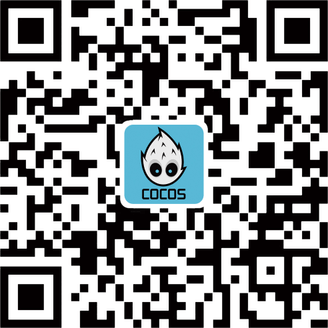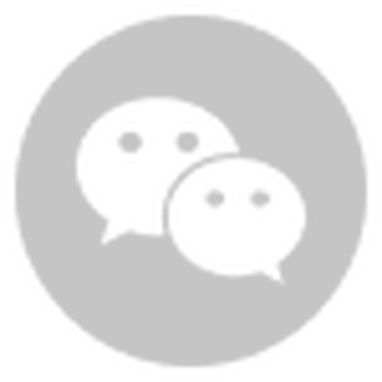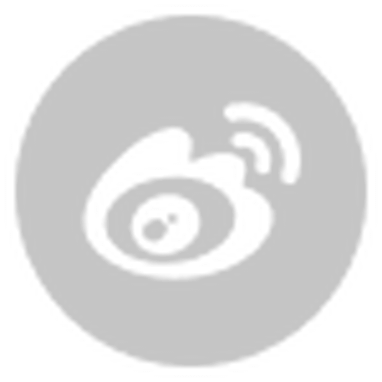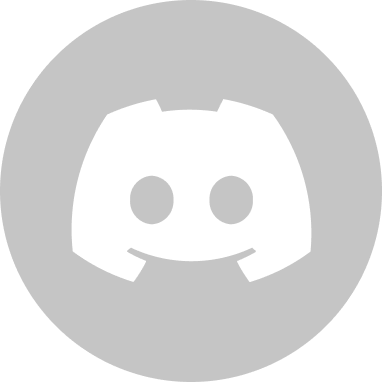Written by Zhe Wang, CEO of Cocos
In July 2010, in the summer heat of Shanghai, a young man waited in line for 2 hours in the blazing sun at the New International Expo Center to get a visitor ticket to ChinaJoy, the largest game show in China, and went from booth to booth introducing his products and handing out his printed business card to get business contacts from each game company.
Years later, I realized that I was in the wrong place, waiting for 2 hours to get into the consumer pavilion when I should have gone to the business pavilion to promote the Cocos engine.
Ten years later, I still miss the hot summer sun, the windowless, drafty hotel, and the young kid who knew nothing about the game industry.
This is the story of Cocos' beginnings, and there are many more small stories like this.
Today Cocos is celebrating its tenth birthday. I look up the passionate articles I wrote in the early years, and ask my partner of ten years, and my friends in the media: what should I write about the tenth anniversary?
The result was a surprisingly unanimous recommendation: there is no better way to commemorate Cocos' 10th anniversary than to write my memories of the time.
Well, that's a good idea, so I decided to do it. In the meantime, our marketing colleagues were very excited to record a tenth-anniversary retrospective video.
The windfall
Most entrepreneurs will recognize the power of the windfall, even though I wrote an article titled "Choice is as important as effort" years ago. There are two types of companies that step on the bandwagon: top industry leaders such as Steve Jobs, Ren Zhengfei, and Lei Jun, who make well-thought-out decisions, and young people who hit it by mistake and have a survivorship bias.
Cocos is undoubtedly in the latter category, and I would never brag about how wise I was or how far-sighted I was in making judgments, which was too much for a 20-something to ask of a 20-something as if I was three years old and proficient in compiling code.
In fact, I started to work on Windows CE drivers and applications for smartphones with a few of my old friends right after graduation, and then out of curiosity, I jumped to Jibit to see what game development was all about. When the operating system needed an engine to build a game ecology, the history of the startup team exploded.
Steve Jobs said, "Connect your dots looking forward." I won't lie, just on the eve of the mobile game explosion, the Cocos startup team had all the prerequisites: smartphone experience from driver to application full-stack, game development experience, no kids, etc., so naturally, we got the best window of time, and the rest of the history is logical.
I remember someone messaged me on Weibo or Zhihu and said, "Cocos is a pig that stepped on a mine, and thought it was going to die."
The first part of the answer is we are fine, but the second part, have you ever seen that pig fly for 10 years? The start is luck, the rest is strength.
Expansion and self-redemption
One of the hardest things in the world is probably self-awareness.
I often criticize young people in my company who are in their twenties for painting themselves into a corner: I'm a programmer, I don't know how to write a product pitch; I'm a liberal arts major, I can't understand all this graphic rendering jargon; I'm a front-end guy, I don't know how to write server-side code - that's the first extreme.
The second extreme is that I'm willing to do anything for the company, so I'm willing to learn about any new field, whether it's technology, marketing, finance, law, company management, business, and so on.
Most entrepreneurs are probably forced to choose the latter approach. When working in the second mindset, once the company has achieved varying degrees of success, it is inevitable to inflate oneself from "I'm willing to do all kinds of odd jobs" to "I can do anything", and this is the great trap.
Of course I fell right in, and after I climbed out, I patted the dirt and dust off my body and saw that Cocos was lucky to be alive, and then I saw that most of my friends had fallen in too, but they just didn't like to talk about their negative history.
For that matter, I think this chart sums it up pretty well.
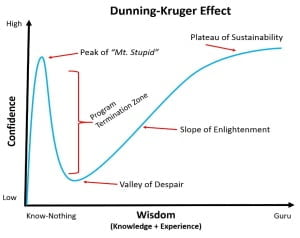
Cocos2d-x reached a peak in 2014, to what extent have we inflated ourselves?
There were over 3000 people at the Cocos conference that year, and the entire main conference hall was packed, and the stairs in the breakout sessions were full. A lot of huge companies were sponsoring the conference as partners, and we really couldn't fit more presentations into the 3-hour main conference room because of the sponsorship, so we had to put them all in a roundtable discussion, and this awkward situation arose.
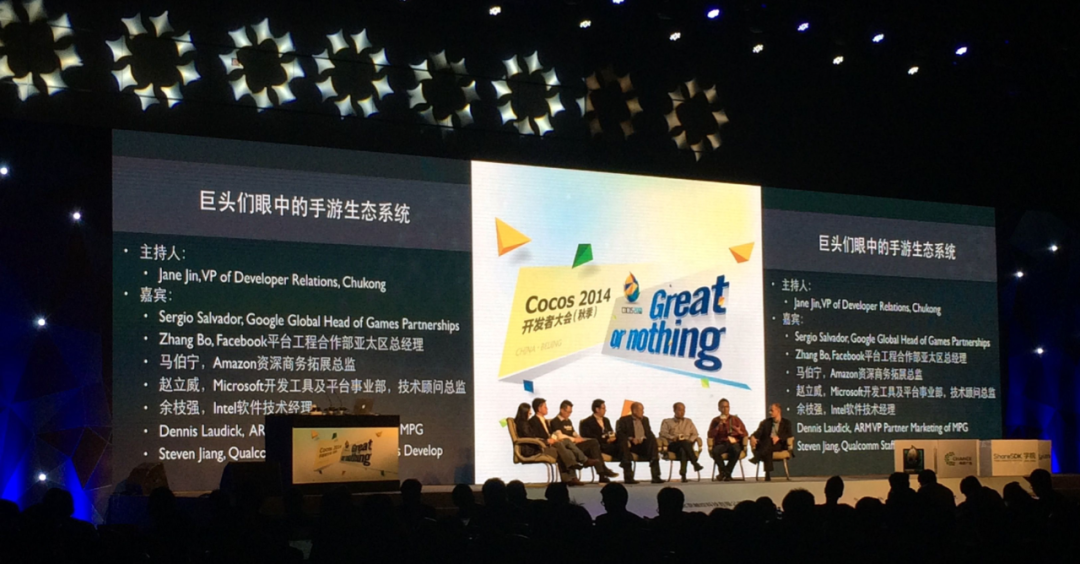
The picture above is only a very superficial representation of the result. I often look up this picture, always remind myself of the mistakes I made back then, and apologize to my partners repeatedly.
The team's self-aggrandizement brought about a deeper level of decision-making errors. We simply think that since 2D can be done, 3D is not difficult. So we went so far as to build a tower directly on the 2D base of the engine, and build up. Until one day the architect said to me: Wang Zhe, the 3D function is not piled up, the building is going to collapse, I can't handle it, I'll leave you to continue to work hard.
The building did collapse, and the entire editor's underlying foundation, the underlying 3D-oriented rendering support, all had to be overturned and reworked.
In the process, we had to knock down all ten floors that had to be repaired, lay a new foundation for the 30-story building, and then build it over again, layer by layer.
This process took us four or five years, so much so that Cocos missed the best window of time for mobile 3D gaming, resulting in the reactive situation we find ourselves in today.
In early 2017, when I axed the entire Cocos Studio project team and shut down the US and Chengdu development teams, it was painful for me to pay for my self-aggrandizing foolishness. Of course, there was a small, resilient group of people left behind who had followed Cocos Studio to Cocos Creator and our upcoming Cocos Creator 3.0 release.
Self-aggrandizement back in the day led to a cascade of poor decision making, all of which were very costly.
It's not surprising that you're reading this at a time when you're probably going through or about to go through a small success and self-aggrandizement phase.
Objectively speaking, I think this phase is inevitable, and the core point is just how to shorten the duration and minimize the losses.
Two weeks ago, an investor friend told me that he saw a young boss of a company 90 years old, who just achieved a little success in two or three years, bought himself a luxury car of more than 5 million, and gave his employees bonuses by withdrawing cash to the company stacked one after another.
Business Model
When many people ask me what Cocos' business model as open-source software is, I really can't give a definitive answer.
I may be considered a programmer geek, but I'm obviously not a business genius.
However, I have a very modest starting point for my thinking.
We are faced with two options: either we can make revenue by selling software products in a brutally simple way, e.g., by selling closed-source Pro licenses, or we can share the value created by helping our partners (developers/platforms/third-party services, etc.) to help them make more money and save more money.
Of course, the latter is closer to the original purpose of building Cocos: To promote the efficiency of the digital content industry with technology.
If we look at it from the perspective of merely selling a Pro version of a software product, we immediately face a game with our customers and we seek to maximize profits and quickly fall into a vicious circle of crack versions and legal letters.
But if we start from another perspective, from the standpoint of improving development efficiency and realization efficiency for our partners and thinking about creating more value with our partner companies, we are willing to share the value created, which is a win-win relationship.
So my request to the commercialization team is first to consider how to let the developers, platform providers, service providers, and other partners improve the efficiency of development and realization, they make more money or save more money, and then we earn money.
The former is the cause, the latter is the effect, and the cause and effect cannot lead to even total disregard for the former. I think this is also the requirement for company strategy in this era - to move from the competitive game thinking to win-win thinking.
From a commercialization point of view, making money is not the ultimate goal of a company, but the natural consequence of creating more wealth for the industry and society.
If Cocos wanted to make a profit today, it would be too easy to reduce investment in future technologies and make a profit immediately. But that would be like killing the chicken and getting the eggs, which is the opposite of what we want.
All of our annual profits are invested in the Cocos engine feature development, new scenario development, and ecological construction because this is our mission.
Frankly speaking, the business model of open-source software is a problem worldwide, and I am just starting from our mission and vision to explore a path that is not clear, with thorns, surprises, and more importantly, the support of our partners, which has helped us increase our commercialization results tenfold over the past three years.
The commercialization of Cocos has just started, and we are still working hard to explore more ways to co-exist, win-win, and have long-term sustainable business models with our partners.
Economical moat
I often envy some companies' business models that, after raising capital, invest heavily in customer acquisition, whether it's by lowering prices, subsidizing promotions, or boldly raising the purchase price, leverage the capital to increase the scale of revenue and market share anyway possible quickly.
But when I calm down, I ask myself, is the engine suitable for this? The answer is obviously no. Because if the opposite were true, Cocos would have been crushed by the more capital-rich vendors.
Ecology is something that requires patience, years of hard work, and a calm mind.
Someone said to me, "Wang Zhe, you don't care about so many things in the company. You record a Cocos video tutorial and sell it online; it's worth millions a year. Why don't you do it?
Well, that's right, we just don't. I have a rule for the engine team: no paid instructional videos, no self-published tutorial books.
I made rules for the engine team: You don’t make your own paid tutorial videos, no publishing your own tutorial books. This is something that should be left to the ecosystem.

What is the environment?
In a superficial way, the environment means that I hold the traffic because I am limited by the company's management ability, or the per capita production value requirements, or the probability of creating hit content, so I have to rely on the ecology to do what I can't do. Then I distribute the money to the content suppliers in the ecology.
In other words, "Since there are many people making money through your platform, they will naturally try their best to maintain the platform's survival."
That makes sense, but it doesn't go far enough because it only considers the first level of revenue for content developers.
Then there is the second tier: the technology/marketing solution providers who serve the first tier of content developers in the ecosystem can also have a stable income and longevity.
The third tier is that the service providers who serve the second tier, the solution providers, can also make money and survive.
The above paragraph is somewhat convoluted. Let's take the WeChat blogging environment as an example: the first layer is the sustainable development of the media; the second layer is the SaaS services for these media sources, such as Little Goose, Weidian, and Youzhan, all of which are doing very well; and the third layer is the general cloud service providers such as UCloud and SoundNet that these SaaS services rely on.
Of course, I'm more familiar with the Cocos ecosystem: the first tier is digital content developers, the second is the many educational and training institutions, publishers, and extension developers, and the third is bloggers and media who teach others how to make Cocos extensions.
The economic moat of the Cocos engine is precisely that: environmental.
You can use technology as an economic moat, but it's likely to be crushed by a few hundred PhDs. You can use capital leverage as an economic moat, but there are plenty of wealthy gold masters in the world, and we chose to open source our technology and then use ecology as a moat.
The environmental thing is that it's useless to invest a lot of capital in a short period of time, and it's ineffective to crush technology in a short period of time, and there is a very obvious lag effect, which is at least half a year to a year. This is enough time for us to react and reorganize our defense and offense.
From the outside, Cocos looks like a small, invincible force; I can't say whether it's a small force or a small universe, but it's an objective fact that it's invincible because the environmental moat is always there.
Ten years of grinding a sword
Where we fall, we rise, and the 3D engine that I hoped for and promised in 2014-2015 is now what the team has finally built with Cocos Creator 3.0, is what we thought the engine should look like even a decade ago when we were a startup.
Cocos Creator 3.0 has the features that the team and I were hoping for and promising in the early days.
A redesigned underlying framework for 3D games, supporting both 2D and 3D content creation. Continues Cocos' advantage of being lightweight and efficient in 2D categories while providing an efficient development experience for 3D heavy games.
Cross-platform, across iOS, Android, HTML5, mini-games, and PC platforms, with plans to support some consoles, VR, AR, and other next-generation computing platforms in 2021.
For the future, multiple back-end renderers for Vulkan & Metal, with GLES and WebGL back-end support for optimal compatibility.
TS scripts are used on the project side to greatly reduce development barriers and costs, while the underlying C++ native framework and GPU computing power guarantee high performance.
The highly extensible editor plug-in system allows developers to build the most suitable development workflow for themselves.
It is easy to get started, customizable and embeddable, and suitable for 3D content production in all industries.
From day one, Cocos has been committed to the open-source direction of development. Open source means unlimited possibilities. Whether it's a problem fixing, performance optimization, or feature extensions, developers can always have the utmost confidence in the game. Open source also represents our attitude of giving back to the ecology. We hope to help all the new people who want to learn game development globally and carry the dream of developers to continuously improve their technical strength!
Cocos Creator 3.0 is the realization of what the team and I have been hoping for for a decade, but it is by no means a lifelong dream.
We are just step by step, steadily fulfilling the promises we made in the early years and fulfilling the promises we made to the industry.
In the next decade, Creator will build on the foundation of 3.0, break through the ceiling of engine technology, and bring benefits to developers.
Cocos is not like the two competing products in the U.S. with a history of 20 years or so, but a daily accumulation of steps leads to a thousand miles, and daily arching of a single pawn is inexhaustible, and the merit does not end up in the sea.
Beginnings and the future
Looking back at ten years of Cocos history, is it a success? I often ask myself that question.
It's really about how we evaluate success, and different dimensions can lead to different conclusions. And in which dimension is Cocos beginnings defined?
If we say we have created more wealth for our employees and shareholders, then I can only say we have barely passed.
If you add up all the games, education, and applications that have been developed based on the Cocos engine, it's worth hundreds of billions of dollars, hundreds of thousands of jobs, and a lot of master's/journal theses worldwide, and it's spread to a lot of fields other than games.
A large number of young entrepreneurs have been able to use the Cocos engine as the basis for their own creative ideas and have created some of the most famous products in history; a large number of ordinary college graduates with Cocos development skills have been able to earn more than twice the starting salary of their peers.

So whenever we see a Cocos game become a hit, whenever we see a friend's child learning with Cocos online education software, whenever a freshman reports that I've joined a Cocos development position at a company with a high starting salary, whenever we see companies offering high salaries for "Cocos Programmer" on job boards, we are genuinely proud of what we are doing.
Personally, I feel proud when I see our employees fall in love, get married, have kids, buy a car, buy their first home, and move to a bigger one, and run around the office with their kids during summer and winter vacations.
Isn't it my hope, and that of the founding member of a team, that the lives of all the developers involved in developing and using the Cocos engine will get better and better?
I've never forgotten the first paragraph of the opening tutorial of my friend ZhiYi's Cocos2d series, which begins with the following.
“I've learned over the years that it's not always easy to make a decent and respectable life for anyone willing to work hard for it. The tide of mobile development can make more newbies set sail with great difficulty, but you will open the door to the free world".
This has always been our original intention in doing this business. After ten years of engine development, the original intention has not changed.
Happy 10th birthday Cocos!
I wish all developers and families a happy life!


